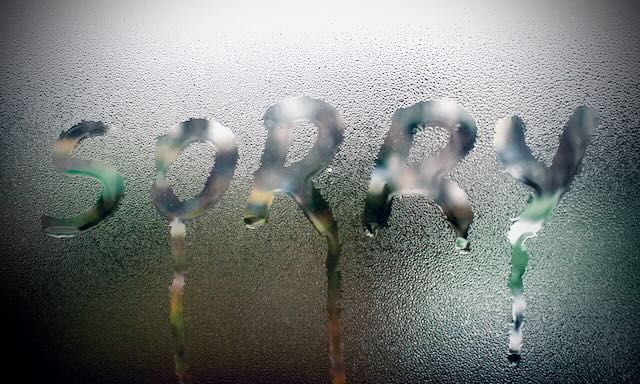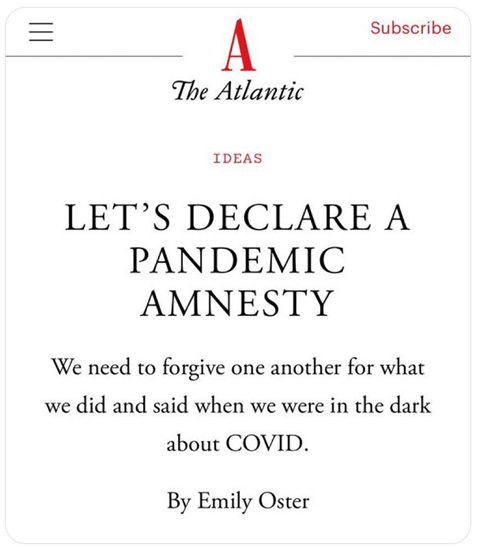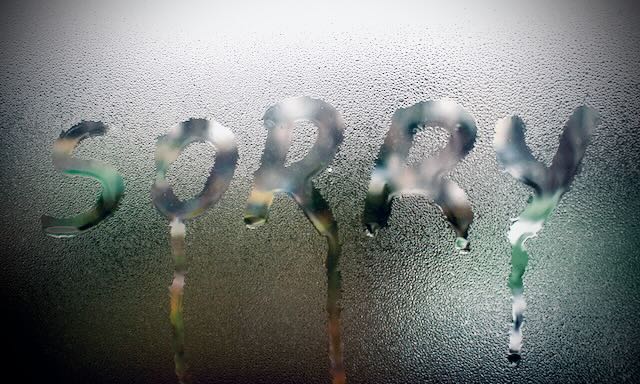
Pursuing the truth in a world full of lies
The Atlantic. What does this phrase conjure up in your mind? Splashing about in the sea in Cornwall? Worries about the direction of the North Atlantic Treaty Organisation?
As of autumn 2022, add another: Professor Emily Oster’s now infamous “Let’s Forget About The Beastly Things We Did During Covid And Just Be Friends” article was, of course, published in The Atlantic:

Professor Oster (who spoke against school closures) is not a principal villain of the Covid piece, but – as discussed at length elsewhere – the complicity of public figures like her undoubtedly helped to legitimise the mainstream response as dictated by the ‘pandemic preparedness’ crowd. Crony capitalist (and crony communist) interests combined with devastating effect, and the lockdown juggernaut reached escape velocity. We needed the ‘head girls’ (of both sexes) to speak out against the inevitable collateral damage from the off, when the subsequent fiasco could more easily have been averted.
But having gone along with all the nonsense, one can see how “hey, we all made mistakes, let’s all be friends” is such an appealing ‘off-ramp’ for those wishing to disentangle themselves from the train wreck, albeit an exit that is an unacceptable rewriting of history for those who got ruthlessly silenced (and worse!) in those dark days:

But back to The Atlantic. You will be delighted to hear that they have issued a strongly-worded mea culpa regarding a lack of curiosity about young sportsmen mysteriously dying, and for rationalising away legitimate concerns about the use of various injected medical interventions due to the “sheer implausibility” of there being a problem: concerns being raised could be brushed aside as the “scale of … [this] conspiracy would depend on too many people keeping it a secret forever, and it would obviously, inevitably come out”.
The Atlantic article also specifically points out that ‘the legacy media dropped the ball while “blogs and Twitter picked up the slack”’ in terms of ‘wider questions of accountability, including the assigning of blame for those who ignored or downplayed the abundant warning signs’… ‘The whole business is a nasty mess’.
Well. A breath of fresh air? An honest admission of blame, and a recognition of the shortcomings of vested business interests and the abject failure of the fourth estate to hold executive power to account or challenge TheScience™ and its crony promoters?
Most certainly this was a full and frank apology (perhaps missing the actual phrase “I’m sorry” – but let’s not quibble) in The Atlantic. Truth and reconciliation starts with recognition of past mistakes.
But – and I guess there had to be a but – lessons may not have been learned.
This apology in The Atlantic was not about lockdowns, or mandated pharmaceutical interventions, or “what we did and said when we were in the Dark about Covid”.
It was a full and frank apology – written in 2012 – when the sordid truth about Lance Armstrong being a serial cheat and liar – had finally emerged, 13 years and 7 Tour de France titles (now rescinded) after he burst – oh so implausibly – onto the professional tour in his post-cancer comeback as part of the ‘Tour of Renewal’ in 1999:
The only time I ever met Lance Armstrong was in 2005, a few months before his final Tour de France win, to interview him for an Outside magazine cover story. Welcomed into Armstrong’s home with chilly hospitality, I was amazed to encounter an Ed Ruscha painting hanging prominently on his living-room wall. Against a backdrop of dark storm clouds, the canvas featured bold white letters spelling out the words SAFE AND EFFECTIVE MEDICATION. I laughed out loud when I saw it.
As I wrote at the time, the painting invited multiple interpretations. It might have been “a sincere acknowledgment of the medical intervention that saved his life, the surgery and the drugs and the rehab that brought him back for an exquisitely leaner, more potent second chance.” It might have been a righteous, arrogant fuck-you to his accusers and enemies, the “trolls” he despised and belittled with open hatred.
“Or finally,” I added, “could it be a dark joke? If Lance has secretly managed to dope all these years—a myth as unkillable as the one about the ruthless efficiency of the CIA—the Ruscha painting is just about the most cynical gesture imaginable, a true leap into the moral abyss”.
The rest of the article is the afore-mentioned heartfelt mea culpa from Hal Espen, the former editor of Outside magazine “from 1999 to 2006, a period that almost exactly overlapped Lance Armstrong’s seven consecutive Tour de France victories”. Espen writes that
“Outside had enthusiastically covered Armstrong’s compelling story from the start… I recall how colleagues who knew much more about cycling than I did were convinced that Armstrong was guilty of doping”.
“I had great difficulty believing Armstrong could be so ethically depraved and reckless, so delusionally invested in denying that a Faustian day of reckoning was coming. It was a failure of imagination on my part, and most excruciating of all, a bet on a losing proposition: that Lance Armstrong would never viciously inflict such pain and betrayal on kids, women, and guys with cancer, and their families, and every person he inspired, and every company that gave him money and trust. I feel a shock of self-recrimination as I try to reconcile my part in lionizing a man who, in hindsight, was almost certainly a cheat and a liar… For a long time, Lance Armstrong was a blue-chip investment, and Outside had a strong business interest in extolling him when he was winning and getting away with it”.
“Armstrong’s continuing silence in the face of overwhelming evidence and near-universal opprobrium is disturbing and haunting… but I also save a small, bitter dose of shame for myself”.
After all, Armstrong had conned Espen (along with a herd-like majority of the public, despite the loud exhortations of a vocal minority) by hiding The Truth in plain sight, making it abundantly & visually clear that this was a story about Safe – and very Effective – Medication:

Ed Ruscha, Safe and Effective Medication, 2001
History may not repeat itself, but it most certainly rhymes.

